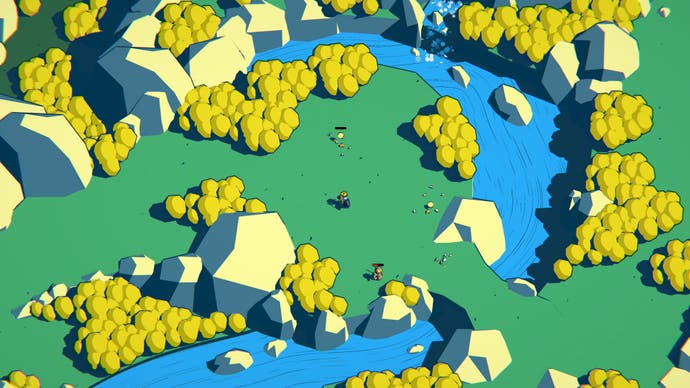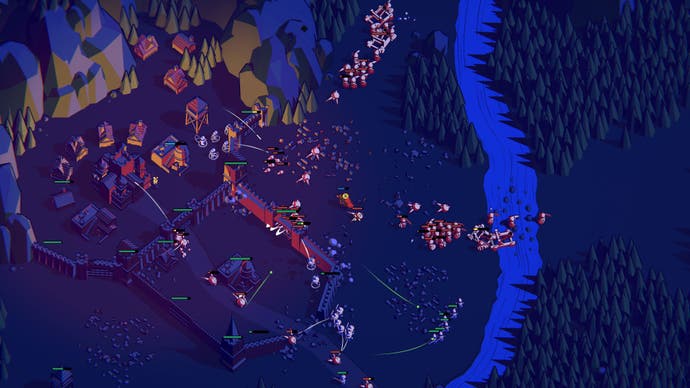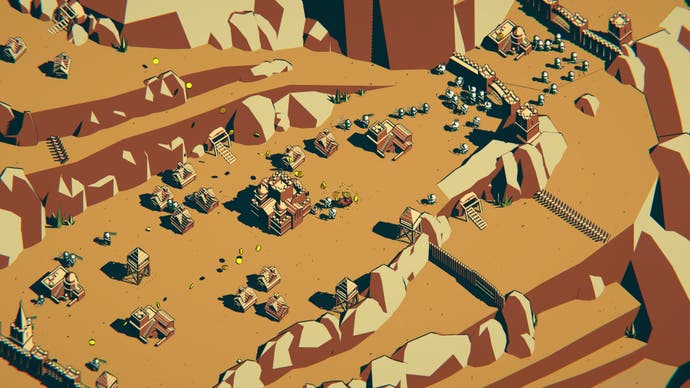Thronefall: kingdom building, hack-and-slash, and the spirit of Lumines?!
The latest from the creators of Islanders is a proper treat.
For the last few days I've been trying to understand what it is exactly that Thronefall reminds me of. This is the follow-up game from the small team that made Islanders, a brilliant minimalist city builder that I properly love. Although Thronefall has its own city building elements and a breezy deftness when it comes to conjuring a sense of nature, it's not Islanders that keeps prodding at the edge of my memory as I play. Thronefall's a sort of tower defence game too, but it doesn't put me in mind of anything from that blessed lineage, either.
Last night, though, after a busy day of Thronefalling, I woke up at four and I suddenly had it. Spectral cubes were falling all around me in the night air and I could almost hear shifting, shuffling beats in the distance. It's Lumines. Thronefall really reminds me of Lumines. And yet Lumines is a block matching puzzle game. What's going on?
We'll get to that in a minute. First, some basics. Thronefall's out now in Early Access. It's a game about building a kingdom during the day and defending it from waves of attackers at night. And spoiler: it's a treat. Every day you spend coins turning little nodes in the landscape into structures: arrow towers and walls for defence, say, houses and mills and farmlands to grow your economy. Some structures straddle the line between defence and economy, rather brilliantly. You can choose, when building a mill, whether you want extra coin production or a mill that explodes when attacked causing damage. It's clever stuff and it's filled with little choices like this.
The kingdom is built around a central hall, and this is the building that you're protecting at night when waves of enemies appear. You can ride out on your horse and lead the battle, and you can also rely on arrows from your arrow towers, and troops, which are created at any barracks you build, and which can then be lead around and placed in useful spots with a few simple button presses. It's all very streamlined, very clean in its thinking. At night you defend, and every morning you get a shower of coins from any economy buildings you have and any coin-bearing monsters you've defeated, and you spend these coins on making your kingdom bigger. That's it. Simple.
So where does Lumines come in? It comes in with the texture of Thronefall, which is tricksy and ever-changing. Lumines is a falling block game that, for me at least, improved on Tetris because it didn't just get quicker the more you played. It got quicker sometimes, and then sometimes it got slower, and sometimes getting slower was more challenging for the player than getting quicker. You don't really need to know why - it's because the timeline that cleared blocks also got slower, meaning that on slow levels blocks would fill up the space more stubbornly - but for the Thronefall analogy to work you just need to understand that, in both games, you're constantly asked to switch speeds. It gives things a lovely tweedy kind of texture. Thronefall, like Lumines, never feels like one thing for very long.

Basic example. You need to think about range in Thronefall, when picking your own hero's abilities and when picking troops to conjure. Will you be fighting close up, meleeing foes, or do you want to hang back and launch arrows, and let your towers whittle away at things too? But complicating the question of range is that Lumines approach to speed. You'll get a bunch of slow, lumbering heavies, say, that do a lot of damage but take an awfully long time to do it. Maybe you're set up for handling that. Great! But next wave, you might get lines of these buzzing little things who pretty much swim through the air. They're weak in terms of damage and defence, maybe, but you now need to be faster to get to them before they can get to your base.
Thronefall is filled with stuff like this, even before you get to the endless stream of unlockable perks that make things easier - maybe a building grants more gold - and unlockable mutations that make things harder but more rewarding - maybe an enemy has more health but gives you more XP. In Thronefall, waves tend to be brisk at first, but once one is over, you always know what's coming next: the enemies are announced on the border. Theoretically, you have all the time to prepare - you get to control when day changes to night, with a stoical blast of a distant horn - but you're also limited in terms of the economy you've constructed and the gold you're bringing in. Thronefall has that classic tactics and strategy game idea of the player never having quite enough resources to do everything. But it also varies the texture of what you don't have quite enough resources to do constantly. Slow then fast. Weak and numerous, then strong but few. Everything in between.
The Early Access build is built for experimentation with all these elements. There are four maps, but lots of perks and mutations and load-outs to unlock and mess around with. It's a high score chaser at heart, which means it's also a laboratory of approaches, and those four basic maps can last you as long as you want, I reckon.

Yesterday afternoon, on the second map, I had a rare moment where everything went my way, when it felt, for a few waves, like I really did have enough time and money and troops to do everything. Wave after wave I arranged my troops in clusters at each entrance to the village, and then I just sat back, lurking near by great hall or whatever it is, safe in the knowledge that my little warriors would handle everything for me and there was no need to micromanage.
In this moment I had time to see how beautiful this world is. The daylight had gone and with it the bright colours of the land and the trees and the paths and the streams. But instead, night had made the world a wine-dark pool of mystery and promise, while my town was lit up by friendly fires, each south face stained a deep flickering orange. Thronefall is pretty special, then. And this is still just the beginning of it, hopefully.


